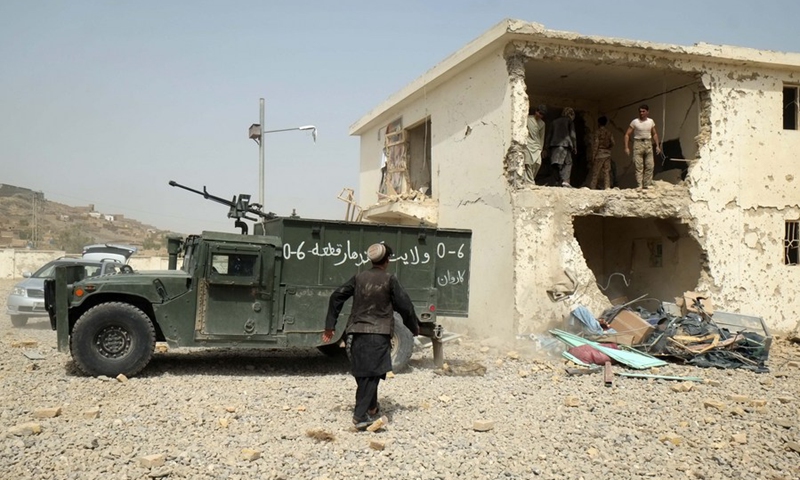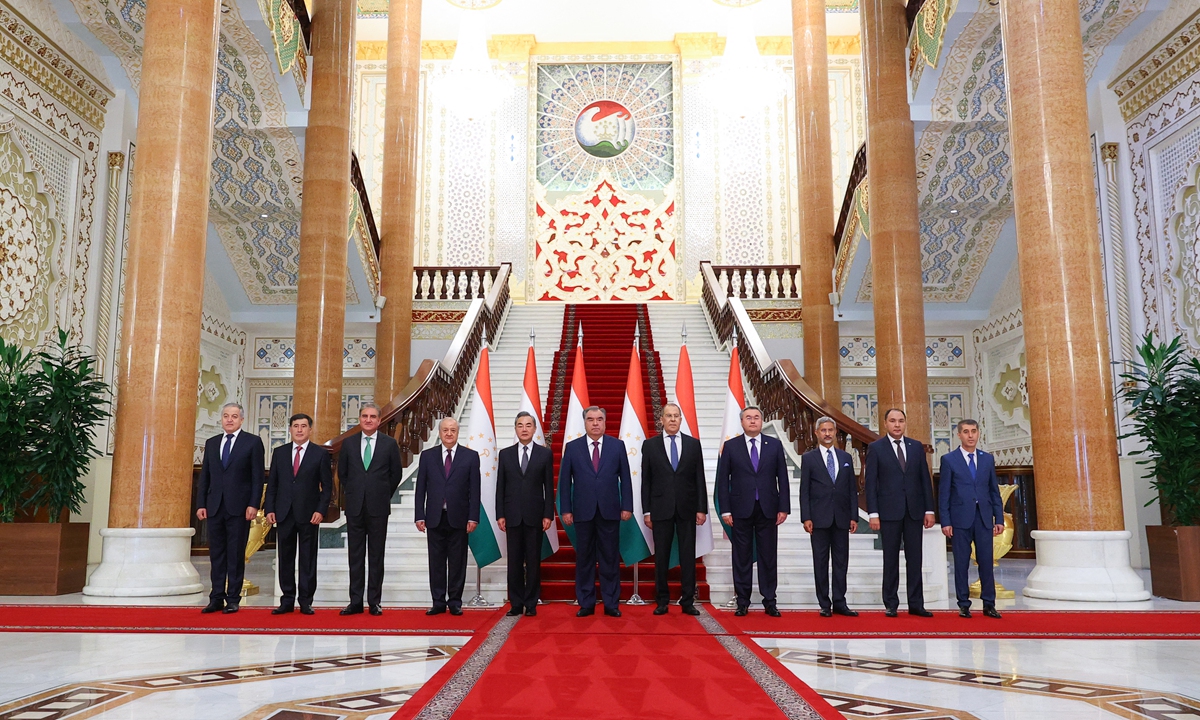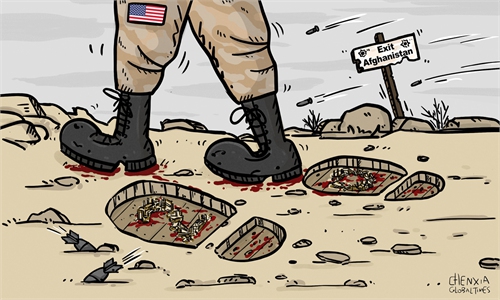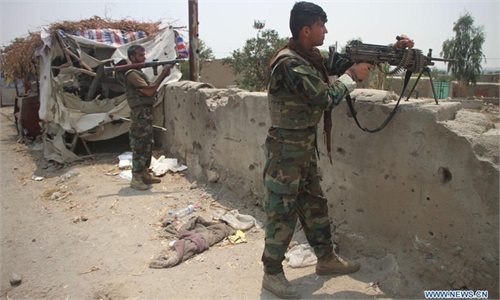China urges Taliban to denounce terrorism
Not time for Afghanistan to join SCO: expert

Afghan security forces inspect the site of a car bombing in Kandahar city, capital of Kandahar province, southern Afghanistan, on July 6, 2021.(Photo: Xinhua)
The situation in Afghanistan is getting more and more complicated as both the Afghan government and the Taliban, which are fighting each other, are making diplomatic efforts to win support or understanding overseas as the US and its allies leave a huge mess in the country and in the region, and China is paying efforts to stabilize the situation and prevent any potential crisis that could impact regional security.
Taliban, as a major military force in Afghanistan, should realize the responsibility it bears for the nation, make a clean break with all terrorist forces and return to the mainstream of Afghan politics, Chinese State Councilor and Foreign Minister Wang Yi said on Tuesday.
Taliban's spokesperson previously called China "a friend of Afghanistan" and said they won't let any force use Afghanistan as a site to attack China, the South China Morning Post reported.
Chinese experts warned that the Taliban's stance sounds positive but to what extent the Taliban can fulfill this promise is a question, so China should be cautious.
In an exclusive interview with the Global Times, Afghan Ambassador to China Javid Ahmad Qaem said Afghanistan is interested in becoming a full member of the Shanghai Cooperation Organization (SCO) and hopes China plays a more active role in building trust between Afghanistan and Pakistan.
Wang made the remarks during a joint press conference with Tajik Foreign Minister Sirojiddin Muhriddin following their talks in Dushanbe, capital city of Tajikistan. Wang is visiting Turkmenistan, Tajikistan, and Uzbekistan this week, and is scheduled to attend the meeting of foreign ministers of the Shanghai Cooperation Organisation (SCO)-Afghanistan Contact Group.

Foreign ministers and officials of the Shanghai Cooperation Organization pose for a photo at a meeting in Dushanbe, Tajikistan. The security situation in Afghanistan dominated the meeting. Photo: AFP
This SCO-Afghanistan Contact Group meeting was elevated to the foreign ministerial level this week for the first time since it was established in 2005, Chinese observers said, noting this indicates the urgency of the Afghan situation and the great attention and consensus of the SCO countries to have a thorough discussion. Six of Afghanistan's neighbors are SCO members.
Some people from the West are urging or expecting China to replace the US and become a new major power to jump into "The Graveyard of Empires" - Afghanistan's nickname - so that China will be trapped and might collapse like the former Soviet Union.
But Chinese experts said this is just another wishful thinking in the minds of some Westerners, and the role that China will play in Afghanistan will be totally different from that of the US, and will be much more reasonable and responsible.
Zhu Yongbiao, director of the Center for Afghanistan Studies in Lanzhou University, told the Global Times that because the US is leaving, some people are trying to exaggerate the strategic value of Afghanistan to China and trying to seduce Beijing into making unwise decisions to intervene in the Afghan situation. Fortunately, China is not as arrogant and ignorant as those major powers which stepped into the country.
"What China wants is mediation between the Afghan government and Taliban, and cooperates with other SCO members - Afghanistan's neighbors - to prevent the spillover of ongoing conflicts or a potential refugee crisis. China is not interested in sending troops to intervene in Afghanistan's internal affairs," Zhu said.
Wang stressed three priorities for Afghanistan. First, to avoid the further spread of the war in Afghanistan, especially an all-out civil war; second, restart intra-Afghan negotiations as soon as possible and realize political reconciliation; and third, prevent terrorist forces from gaining ground in Afghanistan.
He said Afghanistan is an independent and sovereign country. History shows that any coercive intervention in Afghanistan is bound to fail. Wang urged the US to reflect on its role in Afghanistan and how it will meet its obligations for Afghanistan's reconciliation and reconstruction.
Zhu said after the US pullout from Afghanistan, the challenge of terrorism in the region will definitely increase. "Although the Taliban said it won't allow other people or entities to use Afghanistan as a site to attack other countries, this is vague. They didn't promise they will help other countries crack down on terrorist groups in the country or hand over the terrorists under their protection."
Without US troops, those terrorist groups will have more space to act, including the East Turkestan Islamic Movement (ETIM) which threatens China's Xinjiang, Zhu said.
Zhu noted that the Taliban is not a force with ambition and capability to build up a "caliphate" like what ISIS did in Syria and Iraq previously, so it's unlikely to be a threat to the whole region, and the SCO members have enough capability to control the borders so the conflict will remain inside Afghanistan.
If the Taliban or some terrorist groups in Afghanistan prove to be a major threat to the region, China will take action, but now, for the pure counter-terrorism purpose, China is more likely to provide material support, humanitarian aids and weapons to the Afghan government, or have intelligence cooperation, rather than sending drones or ground forces, said Chinese experts.
China's position to Afghanistan remains unchanged and China still praises the Afghan government for making efforts to stabilize the country despite the Taliban expressing friendship to China.
Wang said that the Afghan government has done a lot of work for national unity, social stability and improving people's livelihood, which should be justly evaluated.
China expects Afghanistan to establish an inclusive political arrangement, pursue a Muslim policy, resolutely fight terrorism and extremist ideologies, and commit to friendly relations with neighboring countries, Wang said.
Qaem said, "The contact group was established to bring Afghanistan closer to the Shanghai Cooperation Organisation. And this was an action plan prepared for this contact group, because Afghanistan is interested in becoming a full member in the Shanghai group."
Zhu said now is not a good time because the situation in Afghanistan is not stable, and the situation is changing by the day, so the SCO is being cautious.




